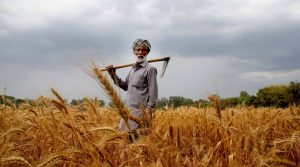Empower inclusive and proficient agricultural and food frameworks
With increasing globalization, agriculture as an independent sector will cease to exist, becoming instead, just one part of an integrated value chain. The value chain exits both upstream and downstream, or from production through to processing and sales, in which the whole is now highly concentrated, integrated and globalized.
This poses a huge challenge for smallholder farmers and agricultural producers in many developing countries where even the most economically valid smallholders can easily be excluded from important parts of the value chain. They are excluded mainly because they may not have the mechanisms to allow them to be included in the new globalized marketplace.
Similarly, poorer countries that may be relatively minor players in the global market place also risk exclusion as bigger players exert greater influence in global markets.
As agriculture and agrifood systems becoming more science- and capital-intensive, new skills and knowledge are required from producers, processors, managers and workers as well as huge investment into research and development. This widens the already large knowledge gap between industrialized and developing countries.

At the same time, urbanization has led to new consumption patterns for the majority of the world population, making the links between production and consumption more complex, and calling for more sophisticated infrastructure. Global agricultural markets become more integrated; with expansion of futures trade, they also become more speculative and therefore risky.
Outdated, inefficient and sometimes conflicting policies, laws and regulations, together with uncertain government perceptions of public and private sector roles and responsibilities, difficult access to financial services and weak infrastructure impede the investments necessary to sustainably improve inclusiveness and efficiency in global, regional and national markets.
Prioritizing inclusiveness
Against this background, FAO seeks to intervene to help address the many challenges, across the value chain that small producers, and even small economies face. Food and agricultural systems need to improve their inclusiveness by linking smallholder producers (farmers, foresters and fisher folk and their organizations) with agribusiness enterprises and supply chains for their effective and sustainable participation in rapidly changing global, regional and national markets.
This implies that FAO needs to work with countries and decision-makers that face these new challenges by providing them with the tools they need such as analytical information as well as in information gathering; in developing sound policies; in developing capacity at the institutional and individual levels; and in helping to fight food losses and waste.
Partnering with business, the main global player
In so doing FAO also needs to partner with the private sector which plays a fundamental role in helping to shape the international marketplace. Despite growing recognition by agri-food and forestry companies that mainstreaming of responsible practices is a competitiveness factor, few companies have succeeded in identifying and scaling inclusive and efficient business models. Global companies need to mainstream principles of corporate social responsibility practices and mechanisms to ensure accountability.
FAO is thus working to facilitate dialogue between governments and the private sector, developing and encouraging the use of voluntary standards, facilitating private investment in good value chains that will include smallholders and others that have been largely excluded.
Further, FAO is working to engage effectively with the United Nations, G8 and other global initiatives to strengthen dialogue and collaborative action with the private sector, particularly multinational corporations, on inclusive technology adoption and fair markets.
The Organization will also play a critical role in developing and promoting international and regional agreements, regulations and other frameworks that promote fair and safe trade and enhance global and regional market opportunities and participation. It will continue to promote, inter alia, international food standards for food safety and quality, through such mechanisms as the Codex Alimentarius Commission.
Similarly, FAO will share its experience in identifying and applying innovative or improved financial approaches and investment mechanisms and services, including the promotion of effective principles for responsible investment, and legal and regulatory financial service frameworks.